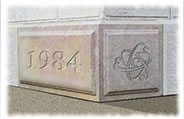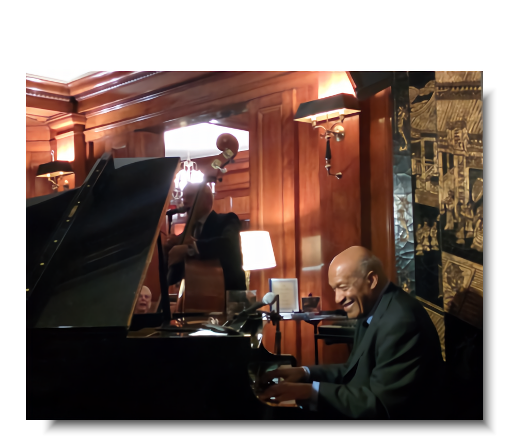Engaged Receptivity
The Sales & Counselor SellingSM Series
“So, I’m sitting in this little room in the old 493 Union Hall, and I’m just playing away, and there’s this old guy standing there. He’s listening to me, probably as long as he could take it, and he said, ‘Hey kid, do you know what’s the most important thing about playing music?’
“And of course, being young, I thought, ‘How dare he interrupt me?’ And I said, ‘Yeah, yeah, your technique, your fingers.’
“He said, ‘No, this is the key: Listening.’
“And of course, again being young, I said, ‘I listen, I listen!’
“He said, ‘I didn’t say hearing. I said listening.’
“And I said, ‘What? They’re the same thing.’
“And he said, ‘No, you hear with your ears; you listen with your whole being.’
“So, he’s leaving the room and he says, ‘By the way kid, it’s the most important thing in life, and it’s a skill you’ll be working on all your life.’
“I wish I could find him today to thank him!”
— Overton Berry (1936 – 2020)
Jazz Legend
Seattle, Washington
It’s not just “the absence of talking.” It’s not “mere silence.” It’s not “waiting to talk.” It’s not being quiet while you formulate your next set of remarks.
Listening is an “engaged receptivity.” It’s being hungry for the other guy’s thoughts… It’s being a magnetic antenna for another mind. It’s a lock, waiting for a key. It’s a negative attracting a positive. It’s an emptiness into which a something-ness is diffused. A great listener is “actively creating a space” for their counterpart to fill.
Imagine playing tennis or chess with someone who didn’t really care about your moves, hit, strategy or actions. It wouldn’t be a game would it? Yet many of us approach a conversation or a client relationship in that very disinterested manner. They say something (while perhaps leaving a few other things still unsaid) and we ignore their origination and proceed to tell the story we came in the door primed to deliver. They listen politely, while their eyes glaze over. (And inside, they’re thinking, “What a fool! She didn’t even get what I said…”) So, when we finish our opus story, they nod and say, “Thanks for coming in… See you next time.” So there’s no shared interest in this conversation. It wasn’t a conversation at all really — just two single players, alone together in the same room.
In tennis (or chess) you have to be deeply engaged and receptive to not only their hit or their move; but also, to divining their strategy, their intention — and their next move. And finding a way to respond that furthers the interaction.
A great listener hears the words but is also searching to apprehend the intention.
And while we’re on the subject, the highest level of the art is listening to discover what has not been said. Yeah, it’s a little cosmic, but you know that there are certain, sometimes older, more experienced, or just more psychic people for whom you have great respect, because whenever you’re together, they listen you into complete silence, and at the same time comfort – for you have nothing…more…to say. Because they really get you. Those are the Great Listeners. And they’re not compelled to start talking the minute you pause for a second. Such are the great counselors, friends, teachers and leaders.
It’s something you can work on your entire life.
Applications:
1. Individually
Start by embracing silence. Think about questions, not answers. “How’s your practice? Who’s your worst client, customer, business partner? Who’s the best? Why? How’s your life so far? Where do you hope to end out your career? What is your Legacy? Is it your kids? Your business? Your practice? Your book? What’s next for you? If you had no need at all to work, would you?” Each one of those questions can kick start a conversation which will mark you as a one of a kind listener and conversationalist — or a very good counselor. Every one of those questions cues up a subsequent line of questions which can easily turn the focus to how you might help your client/customer move into the future they want. But only if you’re willing to listen, not just hear…
2. At Home
10 years together. 20. 30. Is it possible that your partner has evolved into a new part of their life? Have you missed their evolution as your life has evolved? Perhaps it’s time to spend an evening just posing questions with no particular outcome — but for discovering who this person is — now. “Hi. How ya doing? How’s your career? How’s your health? How’s your life working out? What’s your legacy?”
As you relax into just discovering, you may find that person becoming more and more alien to you, and at the same time, more attractive. Hey, you used to know them, but that was a long time ago. Try putting aside an evening without electronic media. There’s hearing; and actually Listening! Same with the kids.
3. At Work
“How’m I doing?” is probably the simplest way to get feedback from your boss, who dies in the face of doing a Performance Evaluation. A simple question, with an ocean of silence behind it can make the boss relax and give you great feedback. But only if you’re really interested, not just angling for a raise…
“I’m sort of terrified to ask this…” is countered by, “I’m sort of terrified to tell you this…” But if neither party is up to the challenge, no communication will actually take place. So, work on your silences: completely engaged receptivity. Being willing to really get what the other has to say means there’s a good chance you actually will. And everything begins right there.
It’s a skill you’ll work on your entire life!
Dessert
Here’s a taste of Jazz Legend, Overton Berry’s musical artistry. Enjoy!.
Subscribe to our Newsletter


